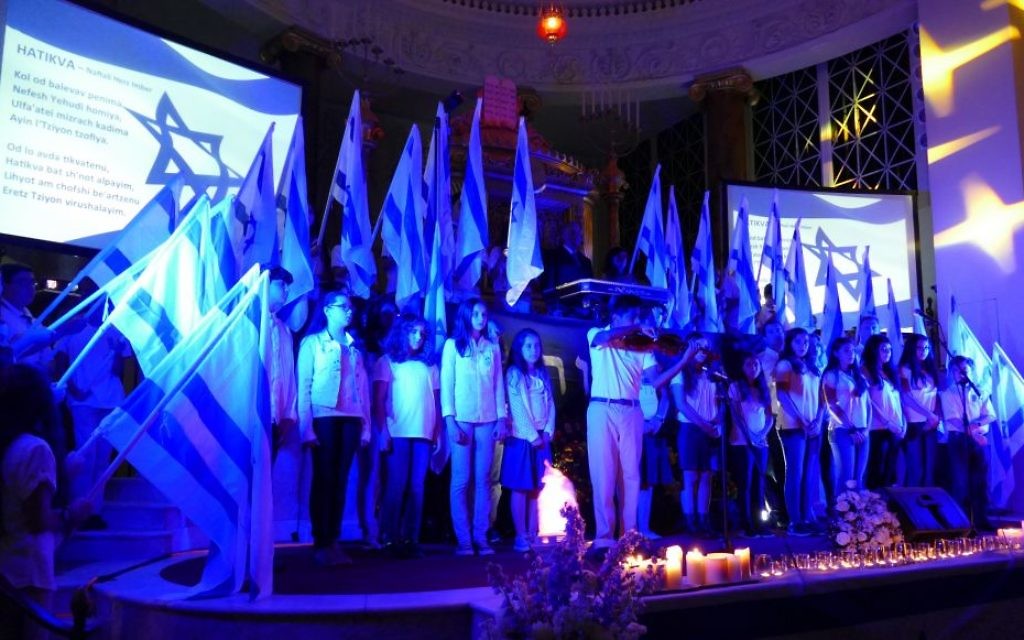Pausing to Remember on Memorial Day
Shouldn't the day for fallen American soldiers mean more than store sales and swimming pool openings?

On a sunny May afternoon, with just a few high clouds, the only sound at Greenwood Cemetery was the wind blowing through the trees.
Two small, frayed American flags, planted on either side of the Jewish war veterans memorial, fluttered in the breeze.
The memorial consists of a circular section — within it a Star of David and the words “Jewish War Veterans of the United States” — atop a base that reads: “In memory of all the Jewish men and women who served our nation honorably. … Dedicated to the principles for which their lives were offered. … And given with the prayer that their sacrifices shall guide us, and all generations, to everlasting peace.”
Get The AJT Newsletter by email and never miss our top stories Free Sign Up
The memorial was “Dedicated by Mack Frankel Atlanta Post 112 Jewish War Veterans of U.S.A. and Ladies Auxiliary, November 8, 1987.”
The cemetery is southwest of downtown Atlanta, just south of Interstate 20.
The memorial sits inside a low, wrought-iron fence, alongside a road that winds through the cemetery, and is flanked by graves bearing the names Cuba, Hirsch, Moret, Rosen, Isenberg and Rachelson in a section marked for Ahavath Achim Synagogue.
A single stone, a sign of respect left by an earlier visitor, rested on its base.
This year, Memorial Day in the United States is May 29. Originally known as Decoration Day, May 30 was set aside to place flowers or otherwise “decorate” the graves of American troops killed in the Civil War. In 1971, Congress moved the observance to the last Monday in May, creating a three-day holiday weekend.
I visited Greenwood Cemetery a few days after Yom HaZikaron, the day when Israel pauses to remember (as of this year) the 23,534 members of the Israel Defense Forces who have died in the service of their country and 3,117 victims of terrorism since Israel was founded in 1948.
The community Yom HaZikaron observance was held at The Temple.
Beneath the sanctuary’s dome, the pews were full, and the overflow stood along the walls downstairs or sought seats in the balcony — in all, about 700 people.
The ceremony, a mix of speeches and video presentations, was conducted in Hebrew and English. Judging by the lusty singing as “Hatikva,” Israel’s national anthem, closed the program, as well as the preponderance of Hebrew heard as the crowd filed out, those attending were overwhelmingly Israelis.
A friend who holds dual American and Israeli citizenship estimated that maybe 50 or so non-Israeli members of the Jewish community had attended, not including those married to Israelis.
The Israelis could be forgiven for wondering: Where were the American Jews, the ones who talk so much about Israel? This event, I had been told, is more important to the Israelis than celebrations of Yom HaAtzmaut, Israel’s Independence Day.
Perhaps that is because they are far from home, where, on Yom HaZikaron, a siren sounds for two minutes and people stop what they are doing, including driving, often stepping out of their cars and standing silently on the roadways.
Perhaps that is because Israel is a small country, where the death of a single soldier has greater resonance than in this country, in part because military service is compulsory for most Israelis (compared with the less than 1 percent of the adult population that serves in America’s volunteer military).
Jews make up less than 2 percent of the U.S. population, but, according to the best available estimates, about 0.3 percent of its armed forces.
In general, the American military is out of sight, out of mind, save for their families and friends. This includes 8,400 U.S. troops still deployed in Afghanistan, as well as nearly 6,000 reported to be in Iraq and several hundred more in Syria.
The American Memorial Day is an occasion for store sales, swimming pool openings and, in a dwindling number of places, parades.
But imagine if, at a designated time across the country, a siren sounded, and millions of Americans stopped what they were doing and stood silently in remembrance of those fallen in the service of this country.




comments